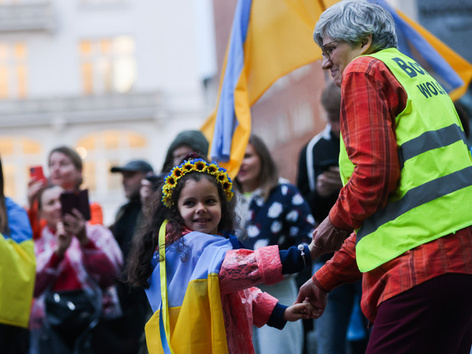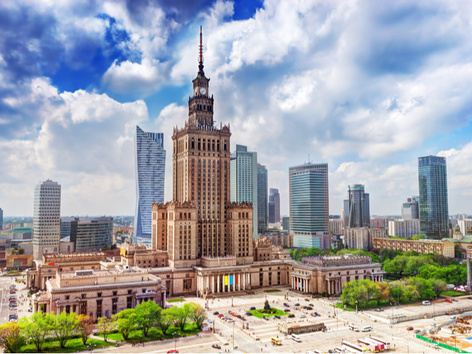Table of contents

According to a survey conducted by the team of the Interdisciplinary War in Ukraine Research Laboratory, almost 50% of Ukrainian refugees who have temporarily settled in Poland want to return to Ukraine as soon as the war is over. At the same time, 17% of refugees plan to stay in Poland forever.
With the start of the war in Ukraine, among the 7 million 700 thousand Ukrainians who were forced to leave their homes between February 24, 2022, and May 3, 2022, 3 million 416 thousand arrived in Poland.
The team of the research laboratory together with Ukrainian scientists studied the main problems faced by Ukrainians in Poland, the reasons for choosing Poland as a refuge, and their assessment of Polish aid.
The survey was conducted on social networks by computer web interview (CAWI) from April 15 to May 10. 737 correctly filled answers were analyzed.
Respondents
The majority of respondents are women (97%), the average age is 36, and 76% of them have higher education.
Life in Ukraine
The researchers said: "About 25% of respondents rated their standard of living in Ukraine before the war as good. The average level had 25% of the refugees, good and very good level - 52%. The majority of respondents lived in cities (91%). As for the regions, most of them are from central Ukraine (46%), western (22%), southern (19%), and eastern Ukraine (13%).
Stay in Poland
48% of respondents have not been to Poland before, 43% have been in the country for a short time, 7% have stayed a little longer, and 2% have lived in Poland for a year or longer. At the time of the survey, most respondents had lived in Poland for more than a month (82%), about a month (14%), a week or two (3) and a few days (1%).
Housing and living conditions
Most refugees rent and pay for housing on their own (28%) or use housing paid for by others (16%). Some were sheltered by Polish families (17%) or their relatives from Ukraine who arrived in Poland earlier (12%). 11% live in apartments provided by Poles. 8% live for free in hotels or hostels, 3% - in other types of places, such as clinics, shelters, etc.
Plans for the future
7% of respondents "want to return to Ukraine quickly because they can not stand the difficulties of the situation." 2% plan to obtain Polish citizenship. 16% are not yet sure what they will do in the future.
Researchers report: “Refugees who want to return say that Ukraine is their home and homeland, that life in Poland is expensive, there is no work and the cost of long-term rent should be taken into account. In general, they want to return to their homes and the life they left in Ukraine."
Why Poland?
Poland is the main country of migration for Ukrainian refugees. When asked about the reason for this choice, respondents most often answered that they have family or friends there (44%), Poland is a culturally and linguistically close country (42%), there is an opportunity to get to Ukraine quickly (25%), proximity to their home in Ukraine (24%).
The authors of the study said: “Some people chose Poland because they heard about helping Ukrainians (20%). For others, an important argument was that Poland is a member of NATO and they feel safe here (15%), there is an easy border crossing (13%). 9% said their decision was due to good road and rail links between the two countries. 6% had been thinking of going to Poland before, and 4% of refugees from Ukraine previously worked in Poland.
Evaluation of aid received in Poland
As part of the study, refugees were asked to rate their stay in Poland on a scale of 1 to 5.
Customs on the Polish side of the border received 4.13, service at the current place of residence - 4, service in offices - 3.91, health care - 3.65, and service on the Ukrainian side of the border - 3.65.
The main problems faced
Refugees were also interviewed about the biggest problems they faced while fleeing the war in Ukraine. Separation from relatives who remained in Ukraine was mentioned by 68%, fear of bombing and shooting - 62%, fear for the lives of family and friends who remained in Ukraine - 62%.
Refugees are also concerned about the lack of knowledge of Polish (43%), abandoned assets in Ukraine (41%), lack of finances for living and needs (41%), lack of things, clothes left in Ukraine (38%), lack of clear housing plans in Poland after arrival (34%), problems with finding housing (19%), difficulties in applying to institutions, offices (7%), poor living conditions (1%), rude attitude of Poles (1%).
The level of military trauma
The survey also measured the level of military trauma (RHS-15). Most refugees have post-traumatic stress disorder (76%) and 50% have psychological distress.
Employment and integration in life in Poland
Among the respondents, 18% found a job in Poland, and 71% plan to work in the near future. Almost a third of refugees work remotely in Ukraine and earn money (28%).
96% of respondents have registered or plan to register for PESEL. 25% have children, 70% of whom have applied or want to apply for assistance.
Education
45% of students study in Ukrainian schools remotely. 46% of children went to Polish schools. 45% plan to enroll their children in Polish schools.
Language
Those who understand Polish but do not speak it make up 34%, those who know basic phrases and can communicate in everyday life - 32%. The majority of respondents intend to study Polish in the future (81%).
Those who do not plan to study Polish say they want to return to Ukraine (47%), currently have more important problems than learning the language (20%), have not found free courses (19%), believe that Polish is very similar to Ukrainian and they do not need to learn it (18%), learning is expensive for them (10%), are unable to learn foreign languages (6%), do not like to learn languages (1%).
69% of respondents study Polish on their own. 20% of respondents attend courses at foundations and associations, 12% study language at universities, 10% choose tutoring, 7% study in private language schools, 2% in public schools. 92% of respondents study Polish for free.
Recommended articles
1 min
For refugees
2 min
For refugees



